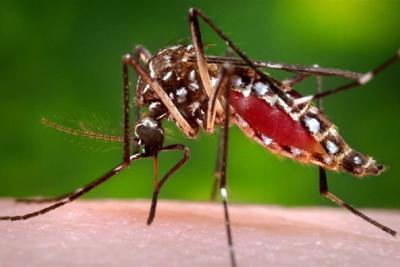NORTH STONINGTON — Mosquitoes from two separate testing pools in North Stonington have tested positive for carrying West Nile Virus.
In separate press releases this week, officials with the Ledge Light Health District said that mosquitoes trapped at Wyassup Lake and Bell Cedar Swamp in North Stonington on Aug. 31 each tested positive. According to data from the Connecticut Agricultural Experiment Station, the positive tests included one mosquito at each location.
Tests run on mosquitoes trapped along the Pawcatuck River and at Exit 30 returned only negative results. Three trap locations in Stonington have also conducted tests with no negative results.
In both cases, Ledge Light officials said the mosquitoes carrying the virus were "not considered a major vector for the transmission of West Nile Virus."
"The positive mosquito (at Bell Cedar Swamp), psorophora ferox, is known to bite birds and mammals but is not considered a major vector for the transmission," the district said in a press release. "The positive mosquito (at Wyassup Lake), uranotaenia sapphirina, feeds primarily on amphibians and invertebrates."
Positive mosquitoes are expected during the summer months, and officials said the recent tests serve as a reminder for why residents should take precautions to avoid being bitten.
West Nile Virus is a mosquito-borne viral infection that is transmitted by the culex species of mosquito. Most people infected with the virus experience no symptoms; however, the disease may be serious or even fatal. Certain populations such as the very young, the elderly and the immune-compromised may be a special risk.
To avoid mosquito bites, consider the following precautions:
- Minimize time outdoors at dusk and dawn.
- Be sure door and window screens are tight fitting and in good repair.
- While outdoors, wear shoes, socks, long pants, and long-sleeved shirts. Clothing material should be tightly woven.
- Use mosquito netting when sleeping outdoors.
- Consider using mosquito repellent when it is necessary to be outdoors and always use them according to label instructions. The most effective repellents contain DEET or Picaridin. Oil of lemon eucalyptus is also effective for brief periods of exposure.
- When using DEET, use the lowest concentration effective for the time spent outdoors (for example, 6% lasts approximately 2 hours and 20% for 4 hours) and wash treated skin when returning indoors. Do not apply under clothing, to wounds or irritated skin, the hands of children, or to infants less than 2 months.
Measures to reduce mosquitoes around the home:
- Dispose of water-holding containers, such as ceramic pots, used tires, and tire swings.
- Drill holes in the bottom of containers such as those used for recycling.
- Clean clogged roof gutters.
- Turn over objects that may trap water when not in use such as wading pools and wheelbarrows.
- Change water in bird baths on a weekly basis.
- Clean and chlorinate swimming pools, and cover pools when not in use.
- Use landscaping to eliminate areas where water can collect on your property.
Additional resources for information on West Nile virus and mosquito management can be found at http://www.ct.gov/mosquito/site/default.asp.
— Jason Vallee


(0) comments
Welcome to the discussion.
Log In
Keep it Clean. Please avoid obscene, vulgar, lewd, racist or sexually-oriented language.
PLEASE TURN OFF YOUR CAPS LOCK.
Don't Threaten. Threats of harming another person will not be tolerated.
Be Truthful. Don't knowingly lie about anyone or anything.
Be Nice. No racism, sexism or any sort of -ism that is degrading to another person.
Be Proactive. Use the 'Report' link on each comment to let us know of abusive posts.
Share with Us. We'd love to hear eyewitness accounts, the history behind an article.